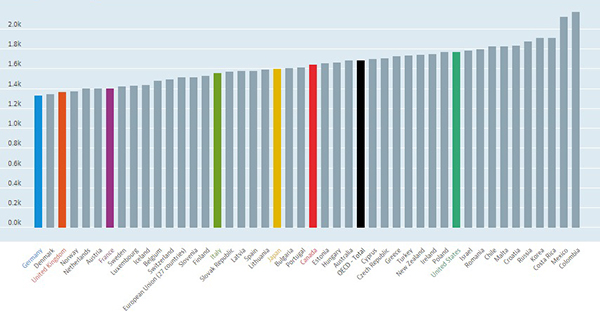
Getting an International Divorce: What to Consider When Breaking Up Abroad
The Trials, Tribulations and Realities of Expat Divorces
With enduring the turmoil of international divorce, you may ask yourself: “what is it about being an expat that makes marriages fall apart?” I wish I could tell you straight, but the answer isn’t that simple.
While you’re living abroad, deeply in love and happily married or in a civil partnership, it’s easy to see your spouse/partner through rose-colored glasses. But as time goes on, you and your partner may realize the spark that initially brought you two together just isn’t there anymore. You’re constantly disagreeing and fighting over the most minuscule things. And you’re finding that you two have personality traits that just don’t go together. Despite the amount of time and energy you put into fixing your marital problems, your world collapses and you decide to part ways.

Divorce, especially for expats, is never easy. The pains, strains and uncertainties of the situation are enough to throw anyone into an anxious spiral. I know, it sucks, it really sucks, especially if you moved to your spouse’s home country or followed them overseas for work.
So… What Causes Expats to Divorce?
As an expat, you can face unique challenges that can strain any marriage, like:
Losing Your Identity in a Different Culture
Chances are, you had to move abroad for your spouse, or your spouse had to move abroad for you. When one, or both of you, live and work in a culture that’s not your own, it can create a sense of disconnect in your relationship, which can lead to frequent fighting and isolation. Just imagine enduring something as tough as culture shock with someone you’re so deeply connected with.
But what if you move back to your spouse’s home country, or they move back to yours? That can sometimes create MORE conflict; one of you feels right at home while the other feels completely out of place. A recent Huffington Post article tells the story of a woman named Lily from Hong Kong. She married a man from the Netherlands who was on a work assignment in her home city. Throughout their marriage, she traveled with him to multiple countries while they started a family together. But while they were living in Addis Ababa, Ethiopia, her husband delivered some shocking news over breakfast: he was leaving her for another woman, moving out of their current home and relocating back to the Netherlands. For Lily, to say the least, her husband’s announcement was both shocking and devastating.

Lacking a Sense of Community
If you and your spouse are moving countries every few years, building a robust support system is difficult when you aren’t around for long. Psychology Today says having friends that aren’t connected to your spouse is not only important, but also healthy:
“Friends help you develop your sense of independence. This matters, because a relationship based on two committed yet independent people is generally healthier than a relationship built on co-dependency.”
Unfortunately, when you don’t have the time to create lasting relationships outside your marriage, it can lead to unhealthy dependencies where you and your spouse rely on each other for almost everything. That can be especially hard for spouses who experience relocation depression.
Fighting Stemming from Cultural Differences and Values
When you first said, “I do,” you probably felt there was no relationship more special than yours. In your mind, you were an unstoppable multi-cultural, world-traveling power couple. If that doesn’t sound glamorous, I don’t know what does. However, throughout the years, you may have realized those same cultural differences that brought you together are what started a lot of your most heated arguments. The reality is, cultural differences can negatively impact your marriage, according to the Global Times. That’s especially true if you and your spouse have a hard time compromising.

While extremes can vary depending on the couple, some of the most common cultural disagreements stem from differing opinions about:
- Finances: Your culture teaches you to be frugal, while your spouse’s culture teaches them to spend generously. Or, your culture teaches you to consider the cost of everything you buy, while your spouse’s culture teaches you not to worry about the cost if you want something.
- Morals and Values: You and your spouse disagree on what behaviors are right and wrong. Or one of you starts changing your views/values while the other feels strongly about the core values you shared up until recently.
- Religion: You’re a devout Christian while your spouse is a devout Buddhist, and you can’t agree on which religion your family should practice.
- Child Rearing: Your culture places high expectations on how children should be raised, while your spouse’s culture doesn’t hold them to as high of a standard.
Opposing cultural beliefs may also upset you or your spouse’s family members, which may extend the fighting outside of your marriage.
Working Long Hours
Working beyond the typical 9 to 5 can take a toll on anyone’s marriage, especially for expats like you. Think the US has the world’s longest working hours? Nope. A recent survey from the Organization for Economic Co-operation and Development (OECD) found that as of 2020, if you’re living in a country like Mexico, Columbia, Costa Rica, Chile, Israel or South Korea, both of you may be working longer hours than you would be in the United States – hard to believe, isn’t it?

But, of course, no matter where you’re both located, working too much can put your marriage on the back burner.
Think about it, you work 12-hour days at the office and when you get home, you’re exhausted. Your spouse tries to tell you about their day and the last thing you want to do is listen to another person’s problems, even if it’s someone you love. It consistently devolves into fights that leave both of you going to bed angry. Or, you make dinner plans with your spouse, and every time you do, they’re always an hour late because they were working, making you feel hurt and unimportant every time.
Dealing with Your Typical Marital Problems
Not every expat couple divorces for expat-related reasons. Sometimes, your relationship doesn’t work out because marriage, whether you’re living domestically or abroad, is hard. For expats, marriage fails for common reasons too, like:
- Growing apart over the years
- Not being financially compatible
- Having an affair/having multiple affairs
- Committing financial infidelity (this article from NPR can give you a broader understanding of what financial infidelity is.)
- Abusing drugs or alcohol
- Experiencing abuse of any kind

No matter where you are, if you are in a domestic abuse situation, seek help immediately. Depending on where you’re located, the following resources can help you:
- National Domestic Violence Hotline (US)
- National Domestic Abuse Helpline (UK)
- Violence Against Women Helpline Directory (EU)
- Ending Violence Association of Canada (CA)
- Asian Task Force on Domestic Violence (Asia)
- Hot Peach Pages (Africa)
- Together for Girls (Latin America)
- Reach Out Australia (AU)
- New Zealand Law-Crime and-Justice (NZ)
You’re Getting Divorced as an Expat… Now What?
At this point, one or both of you have made the decision to part ways. Now, you’re probably feeling a cocktail of emotions hit the bottom of your stomach: sadness, regret, uncertainty, fear and, strangely enough, some relief. But of course, deciding to end your international marriage is just the first step in what can be a long and grueling process. You probably have a lot of questions that don’t have an immediate answer, like: What will I do? Where will I live? How will we split time with the kids? Should I move far away or stay close by? What am I going to do if my ex-spouse moves? Will I receive spousal and child support? Will I have to pay spousal and child support? Where will I find the emotional and financial support I need?

I get it, you want that certainty — everyone does. While I’m not an attorney or divorce professional, a lot of my friends are expats, so I’ve learned a lot through their experiences. I am not here to dole out legal advice or tell you how to handle your divorce, that should be left to your family law attorney, mediator or arbitrator. What I can tell you though, is that there are definitely a few things you’ll want to think about as you begin the process, such as:
Where the Divorce Will Take Place
As an expat, you may have to divorce your spouse more than once. Yup, you heard that right. Some expats register their marriage in both of their home countries. Tying the knot internationally may have been convenient at first. But if you chose this route, you may learn that going through the process twice can create a big headache.
For instance, A friend of mine from Brazil divorced her husband from the US. While they primarily lived in America, they established their marriage in both their home countries. When they decided to end their marriage, they had to get TWO divorces. The Consulate started the process, but, to seal (or unseal) the deal, they had to travel to Brazil… IN THE MIDDLE OF THE PANDEMIC! Her divorce is now finalized, but she told me it was one of the worst things she’s ever endured.
For my friend, the whole ordeal was a major pain. However, know that you’re not destined for the same fate. Whoever you choose as your legal counsel can help you navigate your specific situation.
What Your Financial Situation Will Look Like
Married expats often get used to living on a dual income. When you divorce, you may have to learn to live on one income. Every expat’s financial situation is different, and I don’t know what yours is. But from what I’ve seen, here are a few general scenarios for how things could go:
Living Off One Income as the Breadwinner
If you were the breadwinning spouse, you may not experience much strain. Of course, this can all depend on if you have kids, the cost of living in your current location or if you end up paying spousal or child support. Speaking of spousal and child support, if your spouse doesn’t earn as much, you may end up having to pay both, which can squeeze out your wallet a little more than you’d like. In other cases, you may only have to pay one or none at all. Spousal and child support laws vary from country to country, according to lovetoknow.com. Your legal representative can explain how your country’s local laws/policies apply to your situation.

Living Off One Income as the Spouse Who Makes Less
If you’re the lower-earning spouse, that loss of income may hit you a little harder. Spousal support and child support can help fill the gaps in some cases. But if your regular income and extra support aren’t enough, you may need to seek other options. Finding a living situation that’s both safe and affordable, especially for your kids, is often easier said than done, so take some time to find an option that works for you. In some cases, it may mean moving to another country after your divorce. In others, it may mean staying in your home country with a friend or nearby relative.
Living Off One Income When You’re Not Employed
During your marriage, your spouse may have earned enough for both of you. But now that you’re divorcing, you worry that the split will leave you in a tight squeeze because you don’t have a job. Plus, if your home is far, far away, you may worry about how you’ll get back on your feet. If this is you, you’re not the only one who’s been through this. Many unemployed expat spouses eventually found stable work and financial security after divorce. It just took a little time, patience and grit.
A prime example of this perseverance can be found in our friend Lily, the expat from the HuffPost article. She didn’t have a job when her husband decided to leave her. When her ex moved back to the Netherlands from Addis Ababa, her employment situation forced her to follow him home. For a while, she had to live with her ex’s relatives and worked two to three different jobs to support her kids. While it was a struggle at first, she eventually found a stable job, and everything worked itself out.
No matter your financial situation, know that you’re strong and have what it takes to overcome the barriers that stand in your way.
How You Will Share Custody of the Kids
Child custody can be the most contentious part of divorce, especially for expats. In many countries, family law courts, especially in the United States, tend to put the kids’ best interest first as discussed by Verywell Family in this article. Those interests could weigh heavily in a judge’s decision, alongside other factors. And the United States isn’t the only country that values the needs and desires of children. According to a recent survey from the Centre for Social Justice, a think tank based in the United Kingdom, 89% of respondents said that family stability is important for a child’s well-being.

Like all other facets of divorce, child custody will likely depend on you and your spouse’s specific situation. Based on those I know who have been through an international divorce, here’s how a few different situations could play out:
You and Your Spouse Stay in the Same Country
If you both plan on staying in your current country, this can make things easier, but it certainly won’t be a walk in the park. Your biggest challenge may be figuring out a sound custody schedule. Depending on local child custody laws, you may want to ask yourself:
- Does one of you work more hours than the other?
- Does one of you live closer to your children’s school or their friends?
- Who can take care of the kids financially on their own?
- Does one child have specific needs that require extra attention?
As you’ll learn, there are a lot of grey areas in child custody law, no matter where you live. That’s what your attorney is for!
You and Your Spouse Move to Separate Countries
This is where things can get a little more complicated, as child custody policies can vary from nation to nation. In some cases, one country’s child custody laws can invalidate or contradict another’s. It also doesn’t help that the Hague Convention, an international agreement that helps safeguard adoptions from any of its 96 signatory countries, does not provide clear child custody guidelines. Before I get too into the weeds, I’d encourage you to speak with your attorney. They can likely provide well-needed guidance and explanations.
You are in a Same-Sex Marriage
Same-sex marriage is legal in 28 countries worldwide (source: Reuters), and around 34 more countries recognize some form of a civil union for same-sex partnerships. At the same time, even in countries where same-sex marriage is legal, expats facing divorce could encounter unique challenges. In the United States, for example, if a same-sex couple has children and only one of those parents is considered the “legal” or “biological” parent, the nonlegal parent may not have visitation or custody rights, according to Nolo, a website that provides legal information. I know if that was me, I would be HEARTBROKEN if I couldn’t see or play with my kids again.

What Stuff You’ll Get
Property division, like child custody, is also one of the most contentious matters you’ll deal with during a divorce abroad. At the stage you’re in, it might be tough to say what you will and won’t keep. It depends on what you own. In many countries, things like your car, home, bank accounts, debts, furniture, and even your pets can all be subject to property division. And, of course, dividing your property as expats can make untangling your marriage messier. For instance, let’s say you end up getting the large sectional couch both of you purchased. Yet, you’re moving to Amsterdam, where many apartments and homes are small but very steep and narrow. Will that create some problems? You bet it will!
Only You Can Choose the Path You Take on Your Expat Divorce Journey
I’ve said it before, and I’ll say it again: divorcing as an expat can really suck! But you know what? You’ve got this. I don’t know you personally, but the fact that you’re researching and reading up on this tells me you are smart, capable and can handle any curveballs life throws your way. You’re an expat, how couldn’t you? I’m sure you’ve faced more than your fair share of challenges before divorcing. And while this particular challenge can seem daunting, you’ve got what it takes to power through.
No matter who you are or where you live, the WorldSmart Association (WSA) strives to provide trusted resources, benefits and tips to help expats navigate their lives abroad. For more insightful expat resources on navigating the ups and downs of being an expat, become a WSA member.









